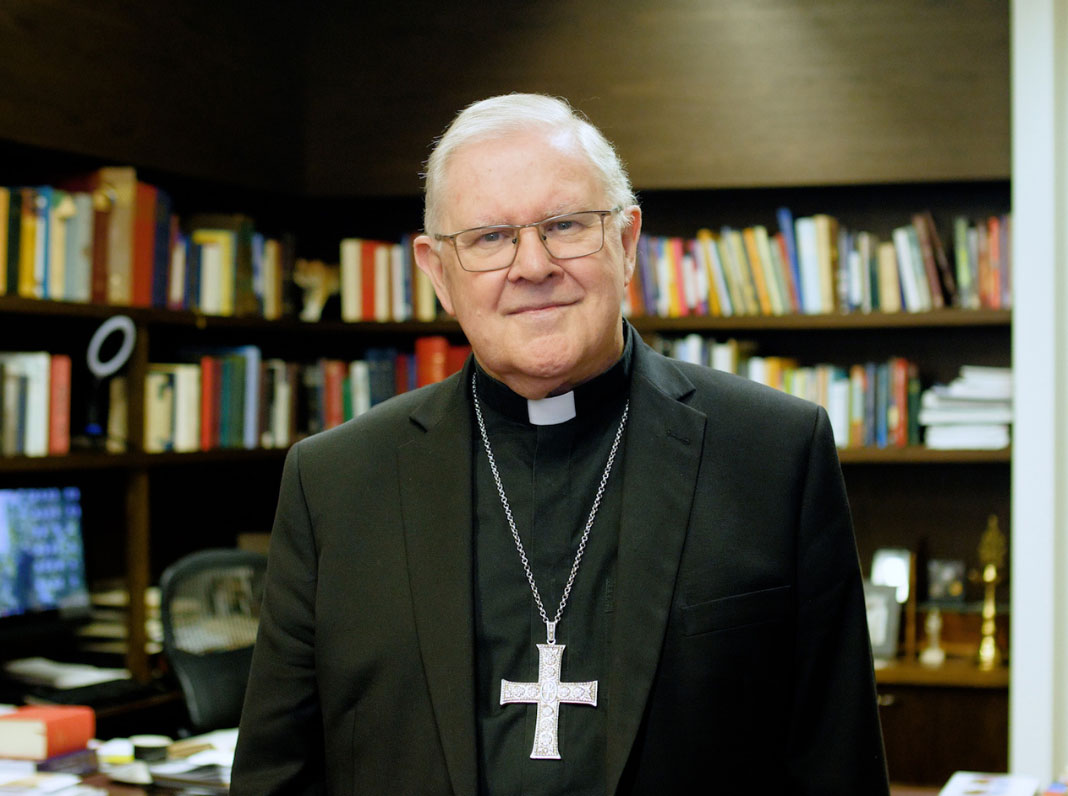In the letter to Corinth we have heard, St Paul speaks twice of home – “an everlasting home in the heavens”, he says, and then a “home with the Lord”. Since the acceptance of my resignation and my impending retirement, I’ve been thinking quite a bit about home. People have asked whether I’m going home to Melbourne to retire; and I’ve said, “No, Melbourne isn’t home for me now. After my years here, Brisbane has become my home. So it’s here I’ll stay”. Yet part of me remains in the places I’ve lived most of my life – Melbourne, Adelaide, Rome, Canberra. What is home? Where is home? The questions can be harder to answer than they seem.
I suspect they were for Fr Terry Hegarty. Before he died, I’d have liked to ask him, “Terry, where’s home for you?” I’m not sure what he would’ve answered. He began life Altrincham near Manchester, born Terence Peter in 1936 one of seven children to Eugene Hegarty and Lillian Carroll, who would have been part of the Irish diaspora. He entered the Minor Seminary at Ushaw College to begin his priestly studies for the Diocese of Shrewsbury. But in 1952 he migrated with his family to Australia where he continued his seminary training at Banyo, having been accepted by Brisbane as a candidate for Orders. In Archbishop Duhig’s last ever ordination, Terry was ordained priest on 29 June 1961 in a class that included John Bathersby. It’s said that Terry claimed that Archbishop Bathersby suggested to him, in jest perhaps, that he could be his Auxiliary Bishop. But that never came to pass
He served first in the Cathedral, then as Assistant Priest in Fortitude Valley, Redcliffe, Gympie and Geebung; and he was for a while part-time port chaplain. The port chaplaincy made a deep impression on Terry, perhaps because it was ministry to those far from home; and he asked in his will that the red ensign of the merchant navy be placed on his coffin. His first appointment as Parish Priest was Tewantin, but it was at Esk that he finally seemed to settle – and settle he did for thirty-three years in what must’ve come to seem home. In the end, I needed a crowbar to get Terry to retire from Esk where, for many reasons, he seemed to have run his race. But once he did retire, he thought retirement was the best thing since sliced bread, and he seemed a quite different man. Looking back, I’d say he was reluctant to leave Esk because there he found a kind of home after a lifetime of searching.
In other ways too Terry wasn’t quite at home in this time, either in the Church or the world. He seemed like a priest from another age, a time less convulsed by change where things were quieter and more stable. Perhaps he tried to create such an environment in Esk as the Church and the world swirled around him. For all his strong opinions, he was endearingly simple, almost childlike at times, certainly not lining up with “the learned and the clever” of which Jesus speaks in the Gospel. He wasn’t made for reading the signs of times as volatile, complex and ambiguous as the years since 1961, which have seen the Second Vatican Council and its aftermath in the Church and endless upheavals in the world. Terry was made rather for doing the simple things parish priests had always done, at any time and in any place. As pastor, he may not have been exciting, but he was devoted in his way. He wasn’t into lateral thinking or bold initiatives. There were few surprises, but he was always there.
In the early Christian text we know as the Letter to Diognetus, it’s said of Christians that “any country can be their homeland, but for them their homeland, wherever it may be, is a foreign country” (chapter VI). That could be said of Fr Terry Hegarty. He had to pitch his tent in many places; he had to make a home there. But all the different places remained in some ways a foreign country, and he had to push on in search of a true home, even to the day he died.
At the very end of his Rule, St Benedict (whose feast we celebrate today) speaks of “hastening to our heavenly homeland” (73). Here he echoes St Paul who says unforgettably in Philippians “our homeland is in heaven” (3:20). There at last is the answer to Terry’s questioning, and to ours. May Fr Terry Hegarty now find the home he sought throughout his life, the home where there is the great feast described by the prophet Isaiah, “a banquet of rich food and fine strained wines”. May he, who was a poor man and a pilgrim, know God’s wondrous hospitality of which St Benedict had such a sense, urging his monks to be just as hospitable, especially to the poor and to pilgrims. I can see Terry now, sitting up, glass in hand, smile on his face, enjoying it all immensely, no longer wearing the clerical collar but free to be himself, home at last with his very own place at the family table, being waited on by Jesus (cf Luke 12:37). Goodbye Terry: thanks for all you’ve been and done, enjoy all that now awaits you at journey’s end. Requiem aeternam dona ei Domine, et lux perpetua luceat ei. Requiescat in pace. Amen.
